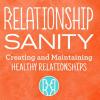
In satisfying and happy relationships, we enjoy both caring for our partners and being cared for in return. But in unbalanced relationships, some of us might use this “caretaking” behavior to avoid intimacy, which inevitably leads to unhappy or broken relationships.
It may sound strange, but most of us have witnessed this play out in our own relationships or in those of our loved ones. We see it when our friend constantly tries to cheer up her chronically depressed boyfriend who refuses professional help, or we recognize it when our brother chooses only to date partners who are unable to pay their own bills. And yet, so often, these seemingly selfless individuals find themselves abandoned by the very partners they sacrificed so much for.
How and why does this happen? Because, when we adopt the “caretaker” role, we minimize our partner’s contributions and exaggerate our own, which creates an unbalanced dynamic that prevents intimacy from developing.
Many of us are guilty of adopting these behaviors in relationships to protect ourselves from the vulnerability that intimacy creates. But, most of us genuinely want to embrace intimacy in our relationships. So, it’s crucial that we identify and address the following “caretaking” behaviors that tend to sabotage our relationships:
1. Rescuing.
If we are constantly seeking someone to save, then we are looking for a relationship where we can adopt some serious caretaking behavior. When we find that person, we may put aside - or appear to put aside - our own safety and well-being to help them. If we are a rescuer, we might marry an alcoholic, victim of abuse, or other person with serious problems. But, if the person we hope to “save” takes the initiative to get better, we usually lose interest, and may even become resentful or feel abandoned if the care we offer isn’t needed or wanted anymore.
2. Performing.
Like rescuing, performing involves elaborate caretaking routines designed to appear as if we are meeting our partner’s needs. But, performances distract us from the discomfort we feel if we become close to another person. For example, we might take on the role of the comedian, constantly using humor to distract our partner from her or his bad mood. This also allows both partners to avoid any uncomfortable emotions, conflicts, or issues. In this way, both partners are able to avoid genuine connection and, without developing a firm foundation for their relationship, allow their relationship not to be taken “too seriously.”
3. Playing the Audience.
If we assume the role of the audience, we appear to accept and benefit from the Performer’s caretaking routine. However, adopting this role also allows us to protect ourselves from the possibility of genuine emotional connection by concealing our real feelings of need and vulnerability. Ironically, when we play the Audience, we never really arrive emotionally in the relationship. Instead, we can maintain a safe distance and let our partner “off the hook,” so that he or she does not have to meet our genuine and legitimate emotional needs.
4. Acting as a Human Antidepressant.
Sometimes, we might try to “care” for others by distracting them from their negative emotions. Those of us who act as Human Antidepressants developed these skills as children, usually in prolonged attempts to cheer up or help depressed or otherwise unhappy caregivers. If we were Human Antidepressants as children, we are likely to become romantically involved with people with real psychological problems such as anxiety, depression, or even personality disorders. But, if our attempts to make them feel better or address their issues don’t work, we are likely to become anxious and resentful.
5. Being a Defibrillator.
While the Human Antidepressant tries to cheer up a depressed partner, a Human Defibrillator will try to shock their partner out of a negative mood. We may do this by telling our partner outrageous stories about our own life-experiences or by acting out in ways meant to provoke or distract him or her. By doing this, we hope to get them to “snap out” of even seriously depressed or withdrawn emotional states. When this doesn’t work, the Defibrillator often feels compelled to up the ante on the performance in order to have an effect on the partner. This often results in out-of-control and unacceptable behaviors that few relationships could or should possibly withstand.
6. Becoming an Absentee.
Ironically, Absentees care for their partners by keeping a distance from them. Being removed releases us — and our partners — from expectations of behaviors seen in healthy relationships that include sharing and mutuality. Absentees are appealing to narcissists or others highly involved with themselves precisely because they do not convey a desire for authentic engagement.
This kind of “caretaking” allows us to disguise even from ourselves the attraction to and the vulnerability we feel with one another. Regardless of how long the routine has been practiced, it’s outcome over time is the same: isolation, feelings of loneliness, and very often, bitterness over our partner’s failure to be a “real” part of our lives.
In a healthy relationship where we are equals, it is the relationship -- not the other person -- that is the project. There is no better prevention against sabotage than true partnership. For a relationship to succeed, both parties need to feel that what they offer is valued and accepted. Each of the caretaking roles mentioned above can be remedied if and when those who are performing them are able to desist from whatever caretaking role they are performing long enough to let the people who they are performing for offer something in return.
Mark Borg, PhD, Grant Brenner, MD, and Daniel Berry, RN are the authors of RELATIONSHIP SANITY: Creating and Maintaining Healthy Relationships (a Central Recovery Press paperback, on sale October 23, 2018) and are practitioners in the mental health field who bring over seven decades of experience working with individuals, couples, families and communities on how to maintain and thrive in loving relationships.








